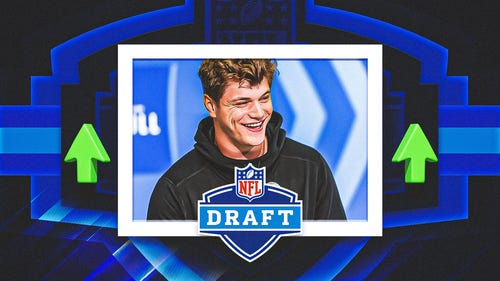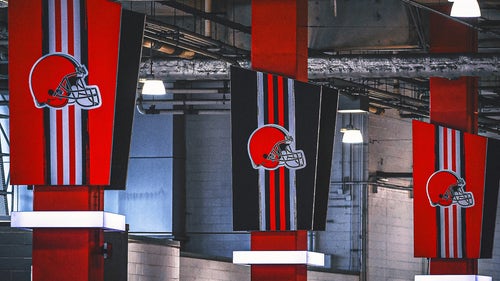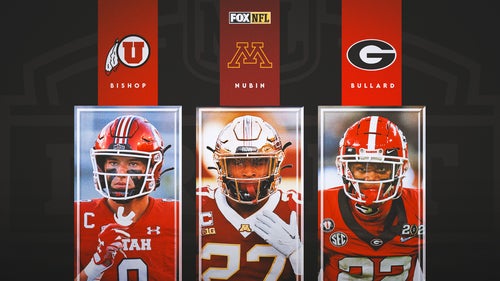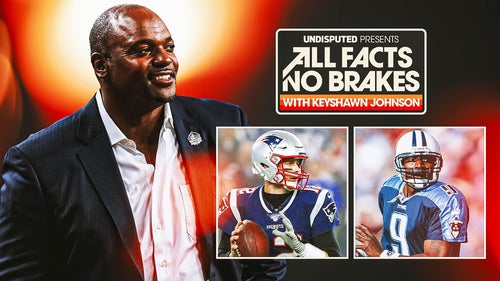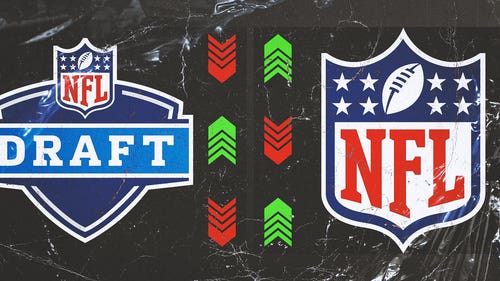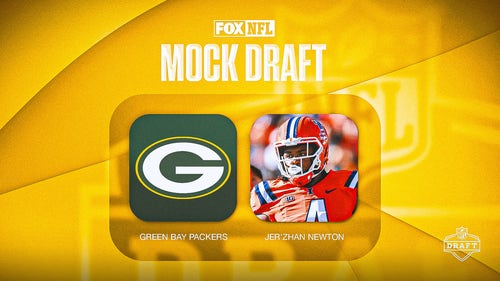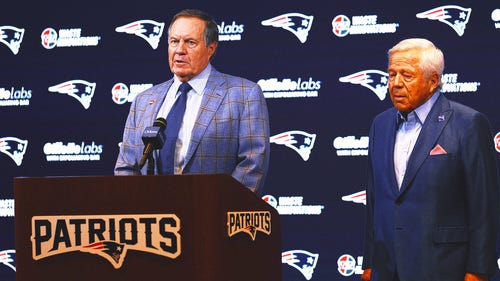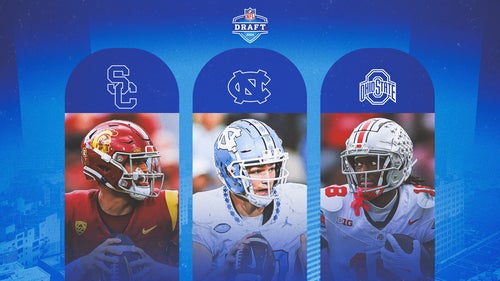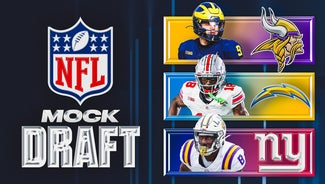
Michael Sam, Jason Collins paving the way for a better workplace, world

Who cares? What’s the big deal? Why are we even talking about this stuff?
These are a few of the questions that have been asked in the wake of Michael Sam’s historic, groundbreaking announcement. Or as Jason Collins prepared to take a historic, groundbreaking first step onto the basketball court as an openly gay man.
And yes, these are groundbreaking moments.
Here’s why.
In a perfect world, we wouldn’t need to talk about all this. Common sense would dictate that all would be universally accepted and treated equal, and that everyone could walk boldly in a world free of discrimination. We’re not in that world, yet. Unfortunately, sense still isn’t all too common.
But do you know what Michael’s and Jason’s courageous first steps have accomplished?
They have brought us one step closer to a day when stories like this will no longer be newsworthy.
What Michael and Jason have done also brings us one step closer to finally dispelling the notion that our locker rooms are bastions of homophobia. They’re not. In spite of what many outsiders may think, players in the NFL and NBA are a lot more accepting than they get credit for.
Years ago, when I was first getting to know writer Cyd Zeigler at Outsports, I felt he had the (mis)perception that football players would be incapable of accepting an openly gay teammate. I told him about some of my experiences and about many of the conversations I’d had with teammates over the years. Then I challenged him to start asking questions. And he did.
I’m glad my suspicions were confirmed and Cyd was able to report that the countless players he spoke with were overwhelmingly supportive of the notion of having a gay teammate. I credit Cyd with helping advance this conversation and giving so many players a voice that was otherwise unheard. I’ve always felt that if and when a player decided to come out, he would be accepted with open arms -- no matter the locker room -- without hesitation. And I’m more certain now than ever.
All of this has also brought us one step closer to players being more mindful of the language they use.
Many players will be forced to confront the language that’s always been such a common part of their vernacular. They will have to actually consider for the first time how they may be hurting the man in the next locker. I know for certain that most men who use hurtful words like “faggot” and childish phrases like “no homo” aren’t necessarily homophobic, and they don’t particularly hate gay people. They’ve just never had an experience or an encounter that forced them to grow up. Well, now’s the time to grow up.
In pro sports, we probably all suffer from a slight case of Peter Pan syndrome. If you’re never forced or expected to grow up, then why would you? But when it comes to our profession of choice, our demands and expectations are quite simple: Is the man next to me doing everything he can to help us win? That’s it.
And for years the idea of a gay teammate was just that -- an idea. I think the digressives always assumed there were perhaps a few closeted gay athletes on perhaps a few football or basketball teams, but now it’s real. It’s no longer speculative. So for all the inappropriate words or phrases that some players would have of course never said around someone who was actually gay, there are now men in their locker rooms or competing against them on game day who are actually gay. I’m confident players will respond appropriately -- with respect. And there’s no need to provide disproportionate coverage to the few on the margins who may be struggling to evolve. They’ll come around.
Michael and Jason have helped bring the NFL and NBA one step closer to clearly defining the locker room for what it is -- a workplace.
Those of us who have spent a lot of time in a locker room have been at some point guilty of saying or doing things that would have likely gotten us fired in a traditional workplace environment. And the same thing goes for coaches who, when it comes to inappropriate language, are often some of the worst offenders. As much as the NFL locker room may sometimes seem like a fraternity, it’s not. And while that environment is one of the things many of us actually miss when we leave the game, we all need to embrace the long overdue changes that are sure to come.
This is where men like commissioners Roger Goodell (NFL) and Adam Silver (NBA), and the NFLPA and NBAPA -- all of whom have been on the right side of this conversation -- have an opportunity to shine. And it really won’t take a whole lot, other than clearly and publicly defining what is appropriate and acceptable at the workplace, and what is not.
Imagine the message it would send if Goodell looked directly into the TV set, speaking intently to his players and to all who are watching, and clearly and emphatically articulated that the word “faggot” will no longer be acceptable language in the workplace. And what if players began to echo Goodell’s sentiment in the locker room, or out in the community, or when they visit schools and speak to children on their days off? That would be a whole lot more powerful than a revised pamphlet on workplace conduct. That would be a game-changer.
This is where I think the Miami Dolphins saga has provided so many teaching moments. I’m not necessarily one to advocate for public ridicule or fines or suspensions for men who behave inappropriately. In many respects, I think that can be counterproductive. In my experience, there’s a much more diplomatic and effective way to educate and change behavior. Sometimes, all it takes is a conversation. So let’s start having those conversations. Let’s make sure players know there’s a Human Resources department upstairs with actual people who have actual names who actually want to help. And while these things may seem like trivial, common-sense concepts, they’ll actually help guys transition away from Neverland and into the real world. If we clearly define the workplace, players will be better prepared for their next career, which is always just around the corner.
I think the journeys of Michael and Jason have brought us one step closer to showing that devout Christians in NFL and NBA clubhouses aren’t going to be overly judgmental menaces looking to ostracize a gay teammate.
Many outsiders assume there will be some Christian crusade with pitchforks raised and torches ablaze aimed at making life miserable for an openly gay player. But I just don’t see that happening. I’ve spoken to dozens of Christian teammates over the years, and without exception, not one said they wouldn’t be able to accept a gay teammate in the locker room if and when one decided to be open about his sexuality. I think many of these men, some of whom are dear friends of mine, have at times been unfairly characterized. Sure, I’ve had my share of debates with them on a host of issues, but I know where they stand on this one.
Hopefully this helps bring all the “unnamed” general managers and scouts one step closer to discovering what a negative distraction really is.
I’ve always felt that if a team decided to pass on players like Michael or Jason because of their sexual orientation, it wouldn’t be about homophobia or a general aversion to homosexuals. It would be because of the perceived distraction that having a gay player might bring. But here’s what I would say to the unnamed: If you can’t handle distractions, then you don’t belong in this business. And for the record, being gay is not a negative distraction. In the short term, you may have to answer a few questions you’ve never had to answer before, but you’ll get through it. Jason Collins played in a basketball game last night. As an openly gay man. And the world didn’t come crashing down. Imagine that.
All the other things that regularly come across your desk -- player gets charged with a DUI, fails a drug test, gets in a bar fight, etc. -- those are negative distractions. And if I’m evaluating players for my roster, those are the red flags I view under a microscope. They don’t automatically cause me to question a player’s character, because anyone can make a mistake. But they make me question his decision-making and whether he can be trusted when he’s out of the building. One’s sexual orientation couldn’t be less relevant to my evaluation of a player. I’m confident the vast majority of club decision-makers agree. Here’s to hoping the “unnamed” begin to figure it out.
Michael and Jason have brought hundreds of men one step closer to having a gay friend for perhaps the first time in their lives.
And what all these men will quickly realize is that this person is really no different from them. He’s not going to make a pass at you. The “gay” in him is not contagious, and it won’t wash off in the team shower. In many respects, they’ll see that this new teammate ultimately shares many of their same dreams and aspirations and that his sexuality is in fact one of the least defining things about him.
And hopefully we’re one step closer to recognizing the difference between tolerance and acceptance.
We “tolerate” mosquitoes. But we should accept people. What you’re about to see are hundreds of men across two sports not merely tolerating a gay player because he’s a peer in their league, but actually accepting him because he’s their friend.
We’ve also gotten one step closer to all players feeling more included at team/family functions.
For 11 years I walked proudly with my wife into team Christmas parties. In doing so, I wasn’t shoving my sexual orientation down anyone’s throat. I was simply sharing the love of my life with my teammates and coaches. Soon players like Michael and Jason will feel comfortable to do the same with theirs, free of concern that there might be an uncomfortable stare or a snicker from the corner of the room. Their loved ones will sit in the family and friends section on game day instead of hiding in some far corner of the stadium or watching from home. They’ll be able to share an embrace with their partner as they exit the locker room immediately after a tough loss, rather than waiting until they get back to the car. In short, their significant other will finally have a seat at the table with my significant other.
And by taking this brave first step, Michael and Jason have brought LGBT advocacy work around sports one small step closer to no longer being needed.
And I think that’s a good thing. In my opinion, it’s groups like “You Can Play” under the leadership of Patrick Burke and Wade Davis; “Athlete Ally” at the direction of Hudson Taylor; the “Trevor Project”; and the “GLSEN Sports Project,” among many others, that have made these groundbreaking moments possible. They have been absolute champions in promoting a sports culture that is free of homophobia and discrimination. They have helped set the template for inclusivity in our locker rooms and on our playing fields. And they have been invaluable resources for so many who were either struggling or who just needed to know they had support. And trust me, these groups would like nothing more than for their work to one day become obsolete because it was no longer needed.
And most importantly, Michael and Jason have gotten us one giant step closer to reducing the suicide rate of gay teens.
That’s not an exaggeration. Michael and Jason are actually helping save lives. There are countless gay teens living, and struggling, in the closet. Maybe they’re playing a team sport and they feel ostracized and unwelcome because of the hurtful language their friends and teammates use so regularly. Or perhaps they’re afraid to play a sport because they don’t think they’ll fit in. Oftentimes this leaves them feeling lost, confused, scared and alone. And in far too many cases, they begin to experience suicidal thoughts.
But now, some of these kids can look to men like Michael and Jason and say, “You know what? I’m not alone. There are others like me.” That’s one huge part of the national narrative that I think is missing right now.
Five years ago my wife and I attended a GLAAD function in Los Angeles. We met a young lady who pulled us aside to describe a tragedy that had recently occurred in her life. Her teenage brother had committed suicide after coming out to a very unsuspecting and unsupportive father. She explained to me that her dad was a big-time football fan, a “man’s man” of sorts, but that after hearing me (a football player he cheered for) speak on the issue of equality, he began to rethink his views. She then challenged me to continue to speak out on behalf of her lost brother, because the “only way to change the heart and mind of someone like her father was for him to hear that people he admires would embrace someone like his son.”
Now just imagine what will happen when men like her father hear the story of Michael Sam and Jason Collins, and he watches as their teammates embrace them like they do any other teammate. That will change hearts and minds. And ultimately, it will help save lives.
And finally, I think we’re one step closer to moving past the questions about whether pro sports are “ready” for this, or whether this is the “right” time.
For many of us, our goal has never been to actively encourage closeted gay athletes to come out to the world. I’m not a closeted gay athlete, so I can’t pretend to know what that feels like. How am I supposed to tell someone else what they should share about their personal life? Instead, the goal has always been to foster the most inclusive atmosphere as possible so that if and when a player decides to come out, he would know he has support.
This was the right time for Michael and Jason, and both were ready now. And that’s all that matters. Now it’s our responsibility to support them and let them do the only thing they want to do.
Play ball.






































































































































